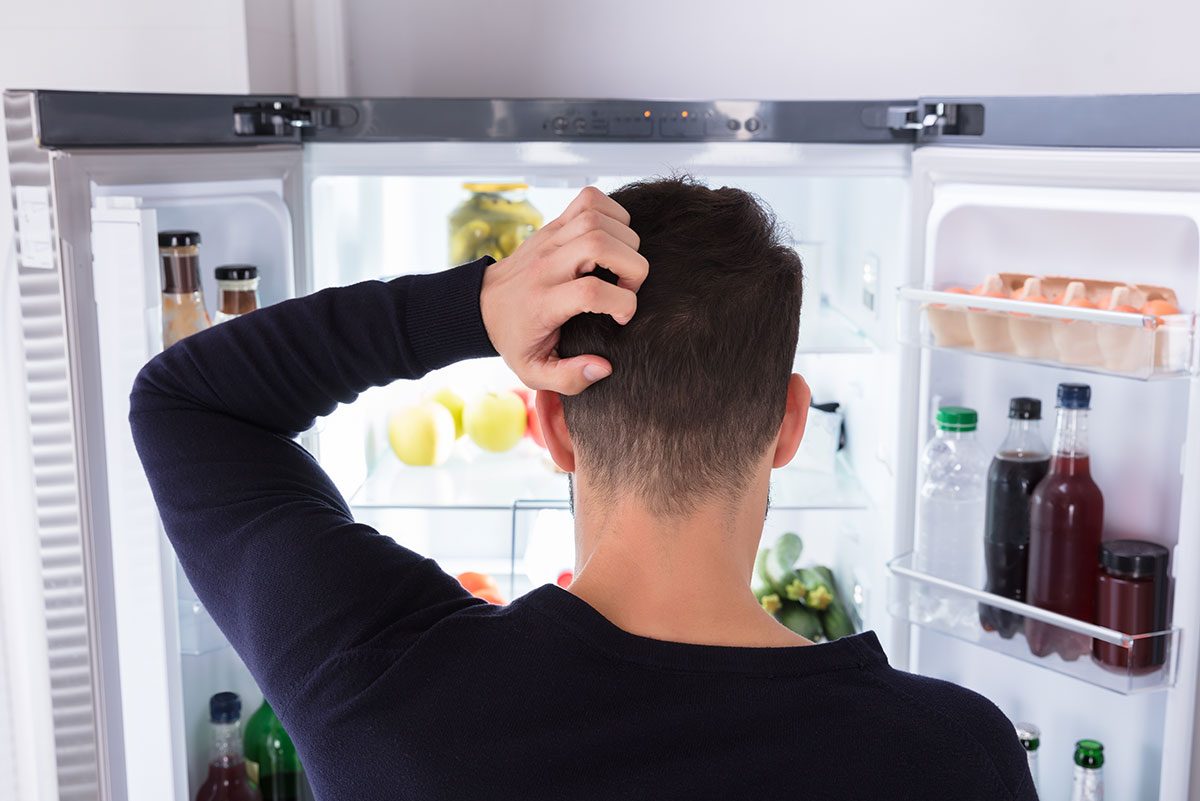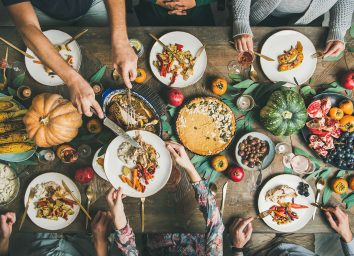Never Do These Things on an Empty Stomach, Says Science

There are some things many of us know we shouldn’t do while hungry. There’s hitting the drive-thru at the nearest fast-food restaurant, for starters. Similarly, going grocery shopping while hungry is proven to be a bad idea, as science has shown that you’re all but guaranteed to buy less-healthy foods than you would if you had a full stomach. And given that a study published in the scientific journal Pharmacology connected hunger-induced low glucose levels with your anger levels, it’s probably a good idea to avoid entering into any potentially contentious conversations with loved ones if you’ve got an grumbling tummy.
But you may be surprised to find out there are several other things you should avoid doing in a ravenous state, from making certain money-related decisions to simply chewing your favorite gum. Curious to know what they are and why? Read on for some of the more surprising things you’d be wise to avoid doing on an empty stomach. And for more on the connection between your mind and body, make sure you’re aware of the Major Side Effects of Being Too Stressed Out, According to Science.
Making financial decisions.

Considering a big investment soon? Don’t make any financial decisions on an empty stomach. New research by The Endocrine Society reports that the “hunger hormone” ghrelin promotes the pursuit of smaller, more immediate rewards over bigger profits that may take a bit longer. When study participants were hungry, they were far more likely to take $20 that day over $80 in two weeks.
“Our results indicate that ghrelin might play a broader role than previously acknowledged in human reward-related behavior and decision making, such as monetary choices,” comments study co-author Franziska Plessow, Ph.D., an assistant professor of medicine at Massachusetts General Hospital and Harvard Medical School. And for more on the science of your mind, read up on What Listening to Music Does to Your Body, According to Experts.
Drinking coffee.

Pouring that towering cup of Joe is practically everyone’s favorite part of the morning. And while cup of coffee on an empty stomach may add some pep to your step, it can also wreak havoc on your stomach. When that morning java hits the stomach lining, it accelerates the production of stomach acid. If there isn’t any food in your stomach to help soak up some of that acid, it can damage the lining of the stomach and cause indigestion and heartburn. Coffee with no food is also much more likely to hit you negatively, leading to jitteriness, shakes, and even an increased heart rate in some drinkers.
Additionally, a study published in the British Journal of Nutrition in 2019 found that drinking a strong coffee after a night of interrupted sleep on an empty stomach can disrupt blood sugar control, which is a major risk factor for both diabetes and heart disease. (So, it’s especially important to eat something before your coffee after a sleepless night.) And according to at least one doctor, there are exactly two times of the day when you should drink your coffee—and neither of them are before eating breakfast.
Going shopping.

You already know to avoid restaurants and grocery stores, but to be safe you should probably avoid stores, malls, and shopping centers of all kinds while hungry. When we’re in a famished state, our brains can’t help but focus on finding and acquiring some food. Those reward-seeking thoughts can inadvertently lead to all types of impulse buys.
One research project from 2015 found that hungry mall shoppers ended up spending 64% more money than other people who went shopping on a full stomach. If you start to feel your stomach rumbling while staring at big-screen TVs and expensive sneakers at your local mall, think twice before pulling out your wallet.
Chewing gum.

Many people like to reach for a stick of gum to help stave off their hunger during those pesky hours between meals, but chewing gum while hungry can do more harm than good. When gum is chewed on an empty stomach, we’re deceiving our body into thinking we’re eating (why else would we be chewing so much?). In response, the stomach kickstarts acid production in anticipation of some nutrients to digest.
When no food arrives, all that extra stomach acid is left bouncing around with nothing to do. Besides just potentially causing indigestion and discomfort, too much stomach acid can also increase the risk of stomach ulcers.
Going to bed.

While it’s true that eating late into the evening is an almost surefire way to pack on the pounds, hitting the sack in a famished state isn’t a good idea, either. Not only will you find it harder to fall asleep and be more likely to awaken periodically, but you’ll also wake up the next day with particularly low energy levels.
Ironically, forcing yourself to sleep each night while starving can actually lead to weight gain. If you toss and turn all night due to your hunger pains, you’ll wake up the next day feeling exhausted. When we’re sleep-deprived, our brains seek out energy in another form: food. In this way, sleeping on an empty stomach can create a vicious cycle of poor sleep and indulgent food choices.
Just like so much else in life, the best approach to managing hunger and bedtime is somewhere in the middle. Don’t go to bed starving, but falling asleep feeling like you’re about to burst isn’t ideal either. If you’re feeling like a bite to eat before bed, don’t deprive yourself, just keep your midnight snack light and easily digestible. And for more tips for getting more Z’s, don’t miss the One Frightening Thing That’s Killing Your Sleep, Says New Report.








